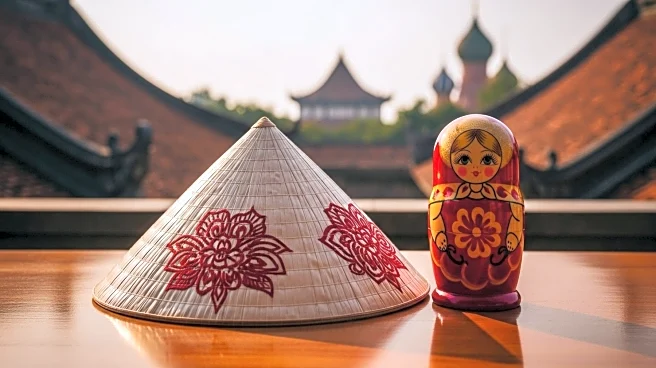What's Happening?
Vietnamese singer Duc Phuc emerged victorious at the Intervision song contest held in Moscow, Russia. The event, a cultural initiative by Russia, is seen as an alternative to the Eurovision Song Contest, from which Russia was excluded in 2022. Intervision featured 23 acts from various countries, including China, India, and Brazil, competing for a prize of 30 million roubles. The contest aims to promote 'traditional family values' and was initiated by President Vladimir Putin. Despite its cultural focus, the event was not without political undertones, as the expected U.S. contestant, Vassy, withdrew due to political pressures. The contest is a revival of a Soviet-era event and is intended to strengthen cultural ties among participating nations.
Why It's Important?
Intervision represents Russia's attempt to assert cultural influence globally, especially after its exclusion from Eurovision. The event underscores Russia's focus on promoting traditional values and strengthening alliances with countries that share similar cultural perspectives. The withdrawal of the U.S. contestant highlights ongoing geopolitical tensions and the intersection of culture and politics. For participating countries, Intervision offers a platform to showcase their cultural heritage and foster international dialogue. The event's success could enhance Russia's soft power and cultural diplomacy efforts, potentially influencing global cultural dynamics.
What's Next?
Intervision is set to continue next year, with Saudi Arabia hosting the event. This continuation suggests a growing network of countries interested in participating in Russia's cultural initiatives. The event's future iterations may further solidify cultural alliances and provide a counter-narrative to Western-dominated cultural platforms. Observers will be watching to see how Intervision evolves and whether it can maintain its cultural focus amidst political challenges.
Beyond the Headlines
Intervision's emphasis on traditional values and the absence of LGBTQ+ symbols reflect Russia's cultural policies and societal norms. The event's 'anti-woke' agenda contrasts with Eurovision's celebration of diversity, highlighting differing cultural priorities. This cultural divergence may influence global perceptions of cultural inclusivity and the role of international events in promoting social values.










